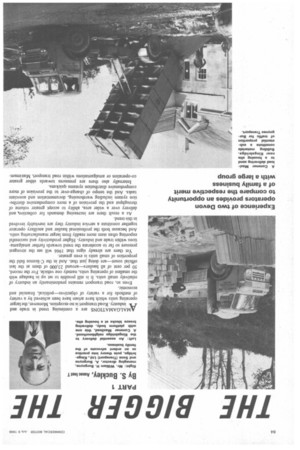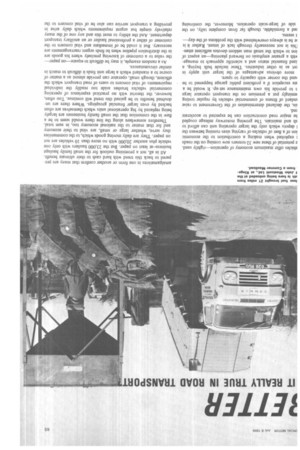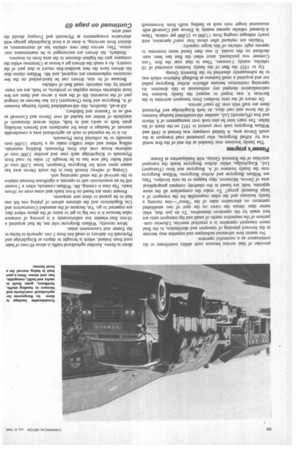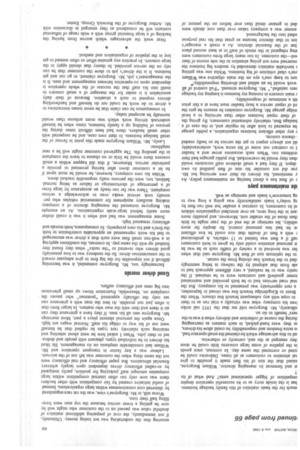THE BIGGER THE
Page 66

Page 67

Page 68

Page 71

If you've noticed an error in this article please click here to report it so we can fix it.
?ETTER
IT REALLY TRUE IN ROAD TRANSPORT
PART 1
By S. Buckley, Assoc Inst T
Right: Mr. William H. Burgoyne, managing director, A. Burgoyne and Sons (Transport) Ltd., Kings. bridge, puts theory into practice as an ardent advocate of the family business.
Left: An essential delivery to the Kingsbridge neighbourhood. A Commer Maxiload., this one with platform body, delivering breeze blocks at a housing site.
AMALGAMATIONS are a continuing trend in trade and industry. Road transport is no exception. Moreover, the larger operating units which have arisen have been achieved by a variety of methods for a variety of objectives—political, financial and economic.
Even so, road transport remains predominantly an industry of relatively small units. It is still possible to set up in haulage with the smallest of operating units, namely one vehicle. For the record, 50 per cent of all hauliers—around 23,000 of them at the last official count—are doing just that. And in the C-licence field the proportion of small units is even greater.
Yet there are already signs that 1966 will see the strongest pressure so far to accelerate the trend towards further amalgamations within trade and industry. Higher productivity and successful exporting often stem more readily from larger manufacturing units. And because both the professional haulier and ancillary operator together constitute a service industry they are inevitably involved in this trend.
As a result there are increasing demands for collection, and delivery over a wider area, ability to accept greater volume of throughput and the provision of a more comprehensive distribution system including warehousing, documentation and associate tasks. And the tempo of change-over to the provision of more comprehensive distribution systems quickens.
Internally also there are pressures towards either greater co-operation or amalgamations within road transport. Maximum ehicles offer maximum economy of operation—rightly used. e potential of these new 32-tonners now coming on the roads t exploited when making a contribution to the economic ion of a fleet of vehicles of varying sizes running between the I depots which only the larger operating unit can afford to sh and maintain. The growing motorway mileage coupled he major road construction can be expected to accelerate :nd.
Lin, the declared determination of the Government to raise indard of fitness of commercial vehicles by regular testing =tingly put a premium on the transport operator large .1 to provide his own maintenance set-up. It would be a Ite exception if a proficient public garage happened to be ,und the corner with capacity to spare.
more obvious advantages of the larger unit apply in ort as in other industries. These include bulk buying, a ized financial status and a scientific approach to managewith a greater emphasis on forward planning—an aspect of ion to which the small man seldom devotes sufficient attenlis is not necessarily through lack of intent. Rather it is ;e he is always overwhelmed with the problems of the day— t seems.
eed a formidable, though far from complete tally, on the side of large-scale operation. Moreover, the continuing amalgamations in one form or another confirm that many are prepared to back this trend with hard cash to their ultimate benefit.
All in all, not a promising outlook for the small family haulage business—at least on paper. But the 23,000 hauliers with only one vehicle plus another 20,000 with no more than 10 vehicles are not on paper. They are daily moving goods which, to the communities they serve, whether large or small, are vital to their economy and for that matter to the national economy too, in sum total.
Therefore somewhere along the line there would seem to be a flaw in the contention that the small family businesses are largely being replaced by big operational units which themselves are often backed by even larger financial groupings. Where there are undoubted benefits to be gained this trend will continue. Too often, however, the theorist with no practical experience of operating commercial vehicles brushes aside too readily the individual requirements of vital concern to users of road transport which the efficient, though small, operator can provide almost as a matter of course to a standard which a large unit finds it difficult to match in similar circumstances.
As a random example, it may be difficult to equate—on paper-the value to a customer of knowing precisely where his goods are in the distribution pipeline when he finds urgent rearrangements are necessary. But it could be of immediate and vital concern to the customer of either a professional haulier or an ancillary transport department. And the ability to meet this and any one of the many relatively simple but urgent requirements which daily arise in providing a transport service can also be of vital concern to the provider of that service because such ability contributes to his continuance as a successful operator.
No matter how advanced techniques and expertise may become in the forward planning of transport and distribution, in the final resort transport operation is a practical exercise. Likewise comparison of the respective merits of small and big transport units are best made by the operators themselves. To do just that, what better than obtain the views on the spot of two established operators on alternative sides of the "fence"—One running a family business and the other responsible for the transport of a large financial group? To make the comparison all the more apposite, both are based in the relatively compact geographical area of Devon. Moreover, they happen to be twin brothers. They are William Burgoyne and Arthur Burgoyne. William Burgoyne runs the family business of A. Burgoyne and Sons (Transport) Ltd., Kingsbridge, 'whilst Arthur Burgoyne heads the transport activities of the Renwick Group, with headquarters at Exeter.
Pioneer's progress The family business was founded at the end of the first world war by Alfred Burgoyne, who pioneered road transport in the south Devon area. A limited company was formed in 1948 and William Burgoyne took over control in 1953 on the death of his father. Ten years later he also took over management of S. Mavin and Son (Plymouth) Ltd., another old-established haulage business of the horse and cart days. At both Kingsbridge and Plymouth there are staff with over 30 years' service.
On return of the twin brothers from transport activities in the Services it was hoped to expand the family business but nationalization damped any enthusiasm in this direction. As operating restrictions became effective Arthur Burgoyne pulled out and acquired a small business at Budleigh Salterton which was to be subsequently absorbed by the Renwick Group.
Up to 1955 the fleet of the family business consisted of 10 vehicles, mainly 5-tonners. Then in that year the first 7-ton Commer was purchased, since when the fleet has been standardized on this model. It was then found more economic to operate eight vehicles of this larger capacity.
Vehicles are replaced after about four years' operation, with yearly mileages ranging from 17,000 to 25,000 per vehicle. These A-licensed vehicles operate mainly in Devon and Cornwall with occasional longer runs such as feeding stuffs from Avonmouth direct to farms. Another agricultural traffic is about 60 tons of baler cord from Ireland. which is brought to depots at Kingsbridge and Plymouth for delivery in small lots from 5 cwt. upwards to farms in the Exeter and Launceston areas.
More recently, William Burgoyne told me. he had acquired a I6-ton four-wheeler but unfortunately it is proving of nuisance value because it is too big to get to many of the places where they are expected to go. Yet, because of the amended Construction and Use Regulations and the ultimate advent of plating one felt one had to be geared to these new measures.
Present rates are based on 8-ton loads and some even on 10-ton loads. The time is coming. Mr. William contends, when a 7-tonner will be an uneconomic unit to operate, a significant forecast relative to the survival of the small operating unit.
Closing of railway branch lines in the south Devon area has meant more work for Burgoyne Transport. Some 3,500 tons of solid boiler fuel now has to be brought 21 miles by road from Plymouth to Kingsbridge each year and another 5,000 tons of seaborne house coal also from Plymouth. Building materials, milling wheat and other traffics make up a further 13,000 tons annually to be collected from Plymouth.
As is to be expected in such an agricultural area a considerable amount of haulage is done for merchants and farmers including grain both in sacks and in bulk, whilst several thousands of standards of timber are hauled all over Devon and Cornwall as well as to Taunton and Salisbury.
All-in-all, therefore, this old-established family haulage business of A. Burgoyne and Sons (Transport) Ltd. has become an integral part of the economic life of the area it serves and there are few local industries whose supplies or products, or both, are not transported by this relatively small fleet of vehicles.
Because of its size, drivers can be hand-picked on the few occasions replacements are required, and Mr. William claims that his drivers have the best accident-free record in that part of the country. As a result the drivers get a bonus at Christmas whilst the company gets the highest discount in the area from its insurers.
Similarly, his drivers are encouraged to be maintenance conscious. They service their own vehicles but all maintenance, as distinct from servicing, is done at a local Kingsbridge garage with alternative arrangements at Plymouth and Torquay should the need arise. much for the basic statistics of this family haulage business. hat is the inside story as to its successful operation despite ompetition of bigger operational units? And what of its
st and foremost its managing director, William Burgoyne. isized that the size of his fleet made it possible to give ml attention to customers at all times. Deliveries could be ;cted or corrected the same day. In contrast, once goods in the pipeline of some large concerns little could be done :hey emerged at the end, correctly or otherwise.
ed to this advantage which he claimed the small operator had, le extra freedom and responsibility he could allow his drivers, se they were hand-picked, in such matters as rearranging during the course of collection and delivery when it was to the ners' benefit to do so.
aificantly, Mr. Burgoyne told me that the 1955 rail strike iven his company what was virtually a trial run as to their to cope with any subsequent branch line closure. When the Brent to Kingsbridge branch line was closed in September, a rare opportunity was presented to his company. But the mal road services had to be both provided and maintained tomer goodwill and contracts were to be retained. If the Lunity was to be realized, a very different approach had to ide from that adopted by the railway in being seemingly ;fled to the branch line closing from the outset.
to the optimum size of fleet Mr. Burgoyne said that when lier was involved in a variety of traffic such as he was he it personal attention could only be given to both customers taff if a fleet was limited to 15 vehicles. A professional r with a fleet of double that size could be less efficient ie he had less personal control. So despite far more isibility. his earnings at the end of the year might be little than those of the smaller unit. Moreover, and possibly more :ant in the long term, an over stretched organization seldom xi its customers. In contrast a smaller but well run fleet by rig today's loads satisfactorily was going a long way to ng tomorrow's loads and earnings as well.
de maintenance pays of fleet has a direct bearing on maintenance policy. As y mentioned, his drivers do their own servicing but Mr. yne did not consider his size of fleet justified its own depot. If they had a small skeleton staff occasions would ihen they would be overworked. But public garages had their roblems too. When such occasions arose and a haulier I to contract out some of his extra work, understandably tld not always expect to get the service he so badly needed
• chance custom.
!. any other efficient business organization, a public garage be expected to look after its regular and, in the case of a haulage fleet. relatively substantial customers. By giving the of their repair business other than servicing to a local ridge garage Mr. Burgoyne considers he ensures he gets the rd of repair service a busy haulier must have at a fair price ith a minimum of responsibility.
main concern in running my business is keeping my haulage riers satisfied," Mr. Burgoyne stressed. "Full control of all work would be an added and diverting responsibility!'
ure to keep one's eye on the main objective was William yne's chief criticism of big business. Whilst one was getting inevitable statistics demanded by modern big business the 3ncerned were not giving attention to the sole source of their ad—the customer. In too many large firms customers were eing relegated in the minds of staff to at least second place :hat of the financial director. As a result a manager's ion to that director became so great that his real purpose 'shed into the background.
sooner was a company taken over than cost details were ded in greater detail than ever before on the pretext of ensuring that the undertaking was not losing money. Ultimately, if not immediately, the cost of preparing additional statistics of doubtful value was passed on to the customer who might well by now be getting a lower service because the top men were formfilling half their time.
Worse still, in Mr. Burgoyne's view, was the rat race engendered by distorted cost consciousness within large organizations. Instead of useful initiative created by fair competition with other hauliers there was now only too often internal competition within large companies amongst staff jockeying for position, partly instigated by so-called efficiency drives dependent upon largely arbitrary financial allocations. But paper efficiency and real efficiency were not the same thing when the customer was left out of the account.
Labour was a key factor in transport operation and Mr. William laid considerable emphasis on its management. He liked his drivers to be individual types, pleasant with people and dedica ted to their jobs. When I asked how he went about selecting and retaining such relatively rare types he replied that he himself went out of his way to oblige his staff. Normal wages are high.
Once again the personal element plays a part. Most mornings Mr. Burgoyne sees all his men. If they have a grievance they can air it there and then with the man who matters. In larger firms that is often just not possible. At best the man with a grievance can see only the officially appointed "postman" who passes the complaint on. Meanwhile, frustration blows up small grievances into big ones and efficiency suffers.
Good driver morale Increasingly too, Mr. Burgoyne contended, it was becoming difficult if not impossible for the big firm to give adequate reward to the conscientious driver. So the tendency was to lose potentially good drivers who reverted to -the ranks" when they found they finished up with the same pay. In contrast, the conditions applying in a well-run small fleet were such that a driver was encouraged to feel his work represented an appreciable contribution to both the firm's and his own prosperity. In consequence, both morale and efficiency remained high.
Some management was bad and when it was it could shelter more easily behind large-scale organizations. As an example Mr. Burgoyne instanced the managing director of a company making auxiliary equipment for commercial vehicles who personally took several weeks even to acknowledge a serious complaint. There was far too ready an acceptance by large firms of a percentage of shortcomings or failure as being normal. Seldom, too, were the persons really responsible tracked down.
Within his own company, however, he would be most upset if he let a customer down after having promised to provide a particular service. Moreover, if this did happen within a small concern there would be little or no chance to leave the complaint in the pending file. The aggrieved customer might well be a near neighbour.
Lastly, Mr. William Burgoyne made this point in favour of the small haulage business. In their own case, and he suspected with other small hauliers, there had been difficult times during the process of building up a family business, times when he himself undertook driving work which was more arduous than would normally be accepted today.
In consequence he can claim that he never issues instructions to a driver to do work he could not do himself and hardworking drivers respond to such a situation. Because of their daily association it is easier for the manager of a small concern to instill into his staff that the success of the whole operation is dependent upon co-operation between management and men. It is the management's job, Mr. Burgoyne claimed, to go out and get business. It is the driver's job to show the customer that he can rely on the service provided. In theory that should apply in the large concern. In practice any genuine effort so often seemed to get lost in the pipeline of organization and method.
Next week the advantages which accrue from having the backing of a large financial group with a wide range of influential contacts will be considered as they emerged in discussion with Mr. Arthur Burgoyne of the Renwick Group, Exeter.




























































































































